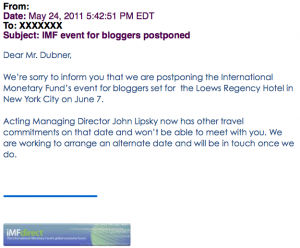The Daughter Test and Why Steve Levitt is Angry About the Online Poker Crackdown
As an economist, Steven Levitt says he has an underdeveloped moral compass. In the past, the University of Chicago professor and Freakonomics co-author has tricked colleagues into drinking cheap wine and opined that drug dealers in Sao Paulo would do a better job keeping communities safe.
But his moral compass went spinning when the U.S. recently cracked down on the top three online poker companies, resulting in 11 indictments. The federal government accused PokerStars, Full Tilt Poker and Absolute Poker of running their operations illegally, including paying banks to secretly process transactions.
“I think it makes no sense at all,” Levitt says. “Most things that are made illegal, everyone agrees on: homicide, theft–there’s a general agreement. And then there are these other activities that fall into a gray area. I think poker is so obviously on one side of the gray area relative to legality that it just doesn’t make any sense to me.”
Levitt says he doesn’t usually get riled up over such issues, but then he realized why he got so angry: his daughter.

